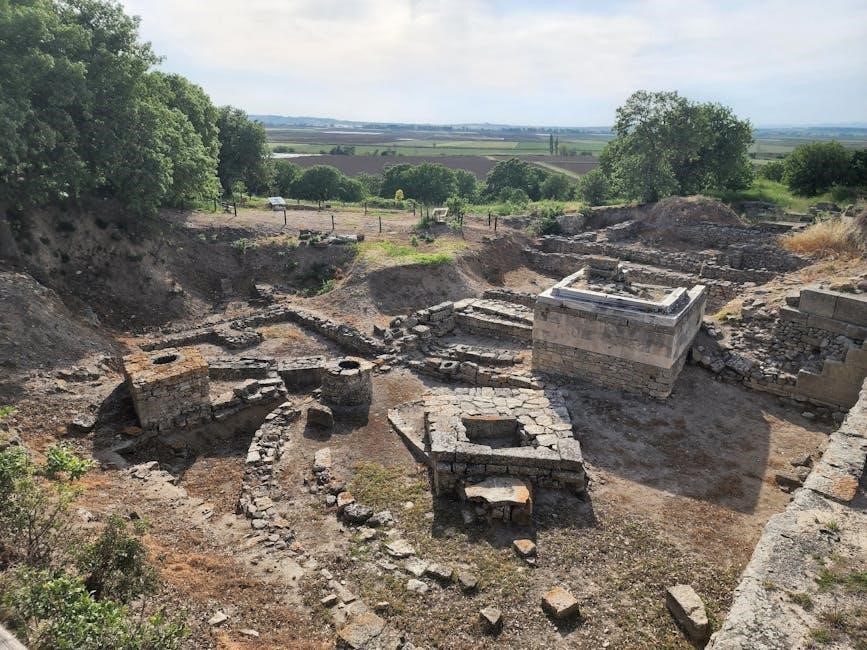
The Iliad, an epic poem attributed to Homer, explores themes of honor, glory, and fate during the Trojan War. Its legendary heroes and poetic structure have made it a cornerstone of ancient Greek literature, influencing Western culture for centuries. Available as a PDF, it remains a vital resource for scholars and readers alike.
Overview of the Iliad as an Epic Poem
The Iliad is a foundational epic poem that narrates the events of the Trojan War, focusing on the conflict between Achilles and Agamemnon. Composed in dactylic hexameter, it embodies the grandeur of ancient Greek literature. Its structure, rich with repetition and poetic devices, underscores themes of honor, glory, and human frailty. As a PDF, the Iliad remains accessible, offering readers a window into its timeless exploration of heroism and fate, resonating across centuries and cultures.
Significance of the Iliad in Ancient Greek Literature
The Iliad stands as a cornerstone of ancient Greek literature, shaping the cultural and intellectual heritage of the West. Its exploration of heroism, honor, and human emotion set a benchmark for epic poetry. As a foundational text, it influenced countless works and remains a vital study in understanding ancient Greek values and storytelling. Available as a PDF, the Iliad continues to inspire scholars and readers, offering insights into the timeless themes of war, fate, and humanity.

Historical Context of the Iliad
Composed in ancient Greece around the 8th century BC, the Iliad narrates the Trojan War, blending myth and history to explore human and divine themes, and remains accessible as a PDF for modern readers.
Background and Composition of the Poem
The Iliad, attributed to Homer, is an ancient Greek epic poem composed around the 8th century BC. Its origins are shrouded in mystery, with debates about whether Homer was a single author or a collective. The poem is written in dactylic hexameter, a rhythmic style characteristic of ancient epic poetry. It draws heavily from oral traditions, with repetition and formulaic expressions common in its structure. The Iliad focuses on a specific episode during the Trojan War, exploring themes of heroism, honor, and human suffering, making it a cornerstone of classical literature.
Mythological and Historical Significance
The Iliad is deeply rooted in Greek mythology, recounting the legendary Trojan War and the exploits of heroes like Achilles and Hector. It bridges myth and history, reflecting the cultural and societal values of ancient Greece. The poem preserves the oral traditions of the time, blending divine intervention with human drama. Historically, it offers insights into the late Bronze Age and early Greek civilization, while its mythological elements have shaped Western literature and art. The Iliad’s influence remains profound, making it a cornerstone of classical studies and cultural heritage.

Structural Elements of the Iliad
The Iliad is composed in dactylic hexameter, divided into 24 books, each focusing on specific events and character arcs, emphasizing repetition and poetic meter.
Themes and Motifs in the Poem
The Iliad explores themes of honor, glory, and fate, central to its narrative. Repetition of speeches, battles, and funeral rites emphasizes the inevitability of destiny. Motifs like wrath, pride, and mourning highlight humanity’s struggle with emotions. The poem delves into the futility of war and the suffering it causes, showcasing the tragic consequences of human conflict. These themes are woven through the epic, creating a profound reflection on heroism and mortality.
Character Development and Major Heroes
The Iliad focuses on the development of legendary heroes like Achilles, Hector, and Odysseus, showcasing their courage, pride, and vulnerabilities. Achilles, driven by rage and a quest for glory, embodies the complexities of heroism. Hector, the noble Trojan prince, represents duty and honor in the face of doom. Other figures like Agamemnon and Priam highlight the human cost of war. These characters’ arcs explore the tension between fate and free will, making the poem a timeless study of human nature. Their stories are now widely accessible in PDF versions of the Iliad.

The Iliad’s Major Themes
The Iliad explores themes of honor, glory, and fate, set against the backdrop of war and human suffering, shaping its enduring legacy in literature and culture.
Honor, Glory, and Fate
Honor and glory are central to the Iliad, driving characters like Achilles and Hector to excel in battle. Fate, dictated by the gods, shapes their destinies, emphasizing the inevitability of their outcomes. These themes highlight the human struggle between personal ambition and divine will, while also exploring the fleeting nature of mortal glory. The poem’s focus on these elements underscores its profound commentary on human nature and the complexities of war, resonating deeply with readers seeking to understand the human condition.
War, Violence, and Human Suffering
The Iliad vividly portrays the brutality of war, emphasizing its devastating impact on individuals and communities. The poem details the physical and emotional toll of violence, as seen in the struggles of Achilles, Hector, and other warriors. Human suffering is deeply explored, highlighting the universal consequences of conflict. The Iliad’s graphic descriptions of battle and its focus on the human cost of war create a poignant commentary on violence, making it a powerful exploration of its effects on humanity.
Key Characters in the Iliad
Achilles and Hector are central figures, embodying the poem’s exploration of heroism and humanity. Their conflicts and struggles drive the narrative, highlighting themes of honor and mortality.
Achilles: The Greatest Warrior
Achilles, the legendary Greek hero, is central to the Iliad, embodying unmatched martial prowess and a complex character. His rage and grief over Patroclus’s death drive the poem’s narrative, showcasing his human vulnerability. As a near-invulnerable warrior, his only weakness is his heel, a tragic flaw. Achilles’s conflict with Agamemnon and his subsequent withdrawal from battle highlight themes of honor and pride. His eventual return to combat and duel with Hector are pivotal, illustrating both his skill and the devastating cost of war.
Hector: The Tragic Hero of Troy
Hector, the noble prince of Troy, is portrayed as a tragic hero in the Iliad, embodying courage, duty, and humanity. He fights to protect his city and family, despite knowing the inevitable outcome. His duel with Achilles is a climactic moment, showcasing his valor and the futility of war. Hector’s death at Achilles’ hands evokes profound sorrow, underscoring the human cost of conflict. His legacy as a defender and a man of honor endures, making him one of the Iliad’s most poignant figures.

Books of the Iliad
The Iliad is divided into 24 books, each focusing on specific events of the Trojan War. These books narrate the conflicts, dialogues, and dramatic moments, providing a structured exploration of the epic tale. Key events, such as the duel between Hector and Achilles, are central to the narrative. The poem’s composition in distinct books allows for a detailed and organized presentation of the story, making it accessible in PDF formats for modern readers.
Structure and Content of Each Book
The Iliad’s 24 books are structured to explore specific themes and events, creating a cohesive narrative. Each book focuses on key moments, such as the wrath of Achilles or the funeral of Patroclus. The content is rich with dialogues, battles, and divine interventions, offering insights into the characters’ motivations and the war’s progression. The organized structure allows readers to follow the epic tale seamlessly, with each book building upon the previous one to heighten drama and emotional depth.
Key Events and Their Significance
The Iliad’s key events include Achilles’ wrath, the quarrel with Agamemnon, and Hector’s tragic death. These moments highlight themes of honor, pride, and mortality. Achilles’ rage drives the plot, showcasing his humanity and the devastating consequences of unchecked emotion. Hector’s demise symbolizes the futility of war and the inevitable fate of Troy. The Funeral of Patroclus and the use of the Trojan Horse further underscore the epic’s exploration of grief, strategy, and the clash of human wills. These events remain central to the poem’s enduring relevance.

Reception and Legacy
The Iliad’s profound influence on Western literature is undeniable, shaping themes and storytelling for centuries. Its PDF versions ensure accessibility, preserving its timeless appeal for modern readers and scholars.
Influence of the Iliad on Western Literature
The Iliad has profoundly shaped Western literature, inspiring countless works with its themes of honor, heroism, and human struggle. Its epic structure and poetic depth influenced authors like Virgil and Dante, while its exploration of human emotion remains universal. The availability of the Iliad as a PDF has further amplified its reach, enabling modern readers to engage with its timeless narratives. This foundational text continues to resonate, ensuring its legacy endures across generations and cultures.
Modern Interpretations and Adaptations
The Iliad’s themes of honor, war, and humanity continue to resonate in modern adaptations, from films to novels. Its digital availability as a PDF has made it accessible to global audiences, sparking fresh reinterpretations. Scholars and artists reimagine its epic narrative, blending ancient motifs with contemporary perspectives. This timeless poem remains a source of inspiration, bridging ancient and modern cultures through its universal themes and enduring relevance.

Downloading the Iliad as a PDF
The Iliad is widely available as a PDF online, with reliable sources like oceanofPDF.com and academic sites offering free or paid versions.
Available Resources and Translations
The Iliad can be downloaded as a PDF from various sources, including academic websites like oceanofPDF.com and platforms offering both free and paid versions. Translations by renowned scholars are available, ensuring accessibility for modern readers while preserving the poem’s original essence. These resources provide a convenient way to explore Homer’s masterpiece, making it easier for students and enthusiasts to delve into its rich narrative and historical significance.
Guide to Finding Reliable PDF Versions
To find a reliable PDF of the Iliad, visit reputable academic or literary websites like classics.ox.ac.uk or platforms such as Project Gutenberg. Look for translations by renowned scholars for accuracy. Ensure the PDF is well-formatted and includes introductions or annotations for better understanding. Avoid unofficial sources to maintain quality and authenticity. Always verify the publisher and read reviews to confirm the version’s credibility before downloading.
The Iliad, as an epic poem, remains a timeless masterpiece, offering insights into heroism, human suffering, and the complexities of war. Its influence on literature and culture is profound. By accessing reliable PDF versions, readers can engage deeply with Homer’s work, appreciating its poetic beauty and historical significance. This accessibility ensures the Iliad continues to inspire and educate future generations, maintaining its relevance in modern times.